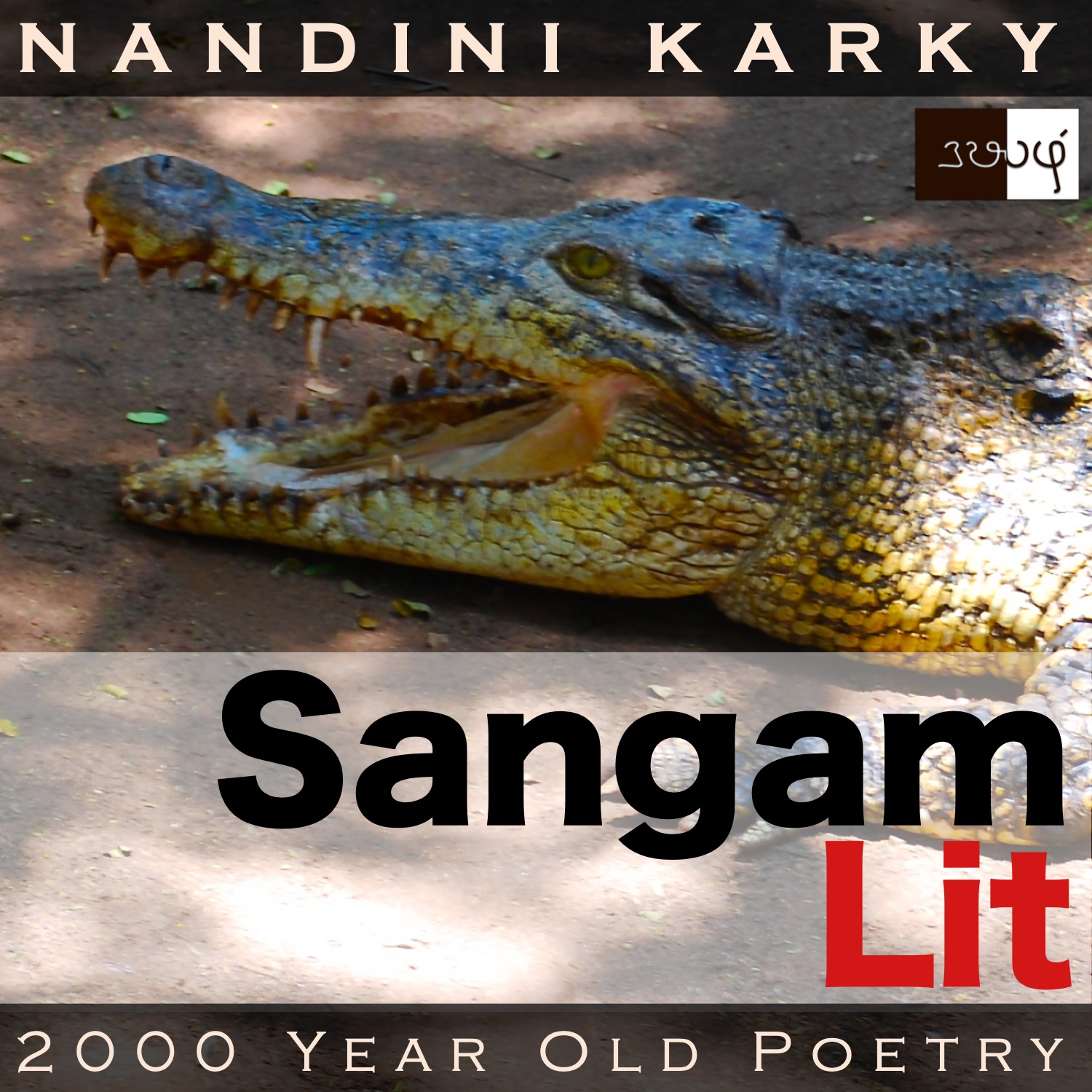Podcast: Play in new window | Download
Subscribe: Apple Podcasts | Spotify | Amazon Music | Android | iHeartRadio | TuneIn | RSS | More

In this episode, we perceive the transition of a mind from assurance to angst, as depicted in Sangam Literary work, Natrinai 287, penned by Ulochanaar. The verse is set in the coastal landscape of ‘Neythal’ and speaks in the voice of the lady to her confidante, passing on a subtle message to the man, listening nearby.
விசும்பு உறழ் புரிசை வெம்ப முற்றி,
பைங் கண் யானை வேந்து புறத்து இறுத்த;
நல் எயிலுடையோர் உடையம்’ என்னும்
பெருந் தகை மறவன் போல-கொடுங் கழிப்
பாசடை நெய்தற் பனி நீர்ச் சேர்ப்பன்,
நாம முதலை நடுங்கு பகை அஞ்சான்,
காமம் பெருமையின், வந்த ஞான்றை-
அருகாது ஆகி அவன்கண் நெஞ்சம்
நள்ளென் கங்குல் புள் ஒலி கேட்டொறும்,
‘தேர் மணித் தெள் இசைகொல்?’ என,
ஊர் மடி கங்குலும் துயில் மறந்ததுவே.
The verse opens with ‘விசும்பு உறழ் புரிசை’ meaning ‘a fort that resides in the skies’. This stuns me because there are no sky-high forts standing in Tamil land from the Sangam era. Was this a case of hyperbole by the poet or could such forts have been razed to the ground by successive invaders? One such enemy king makes an appearance in ‘பைங் கண் யானை வேந்து’ meaning ‘king with an army of fresh-eyed elephants’. The curious phrase ‘நாம முதலை’ piqued my interest, for the word ‘முதலை’ refers to a ‘crocodile’, whereas the word ‘நாமம்’, in current-day lingo, refers to ‘the three vertical stripes worn as a sectarian mark’. However, there’s nothing religious about this crocodile for the word ‘நாமம்’ means ‘fear’ in this ancient context. Ending with ‘ஊர் மடி கங்குலும் துயில் மறந்ததுவே’ meaning ‘even as the town sleeps in the night, sleep forsakes me’, the verse invites us to listen more!
The man and lady had been leading a love relationship and the man had been trysting with the lady by night. In his absence, the lady pines and observing these changes, the lady’s parents confine her to the house. Without knowing this, the man arrives by her house, one night. Pretending not to notice him, the lady says to her confidante, “Even as a king with fresh-eyed elephants surrounded the sky-high fort and made them suffer by laying siege, the great warrior king assured himself saying, ‘A sturdy fort and valiant guards, I have!’ Akin to that, my heart was fearless in the company of the lord of the cool shores, in whose domain, fresh ‘neythal’ flowers bloom in the curved marshes, even when he came here, fearing not those frightening crocodiles, propelled by his great love. But now, hearing a mere bird’s chirp in the dark of the night, I wonder, ‘Is it the clear sound of his chariot bell?’ and forget my sleep, even as night shrouds the town entire, in slumber!” With these words, the lady conveys the fear in her heart caused by the man’s delay in seeking her hand in marriage.
Now, for the nuances! The lady starts by bringing before our eyes, the siege of a sky-grazing fort by a king with an elephant army. From this expansive scene, the lady takes us into the mind of the besieged king, who declares that even though he’s so surrounded by enemies, he takes strength from the fact that his fort walls are impenetrable and that his protectors are courageous. The lady is summoning this mindset as a simile to her own mind, in those times, when the lord arrived in the dead of the night, braving fearsome crocodiles, out of the brimming love in his heart for her. She says that it was with assurance that she faced those moments fraught with fear. Then she compares that calm mindset to how she feels now, confined to the house, and startling at bird calls, wondering if it’s her lord’s chariot bells. She finishes her statement by saying that sleep doesn’t visit her, even as the town entire finds solace in slumber!
A classic case of insomnia, when sleep turns a foe to a mind that’s not at rest! By contrasting the current situation to the past circumstances of the man swimming with crocodiles to see her, the lady is conveying to the man, the graveness of the current situation. She’s stressing the immense toll on her mind and hopes to move the man to alleviate her distress and seek permanent happiness by marrying her. Another verse that seems to illustrate that the happiness and health of a woman depends on the man’s actions. A moment to appreciate and celebrate the self-reliance that has come to many a woman here, two thousand years later, and to wish this for women everywhere!




Share your thoughts...